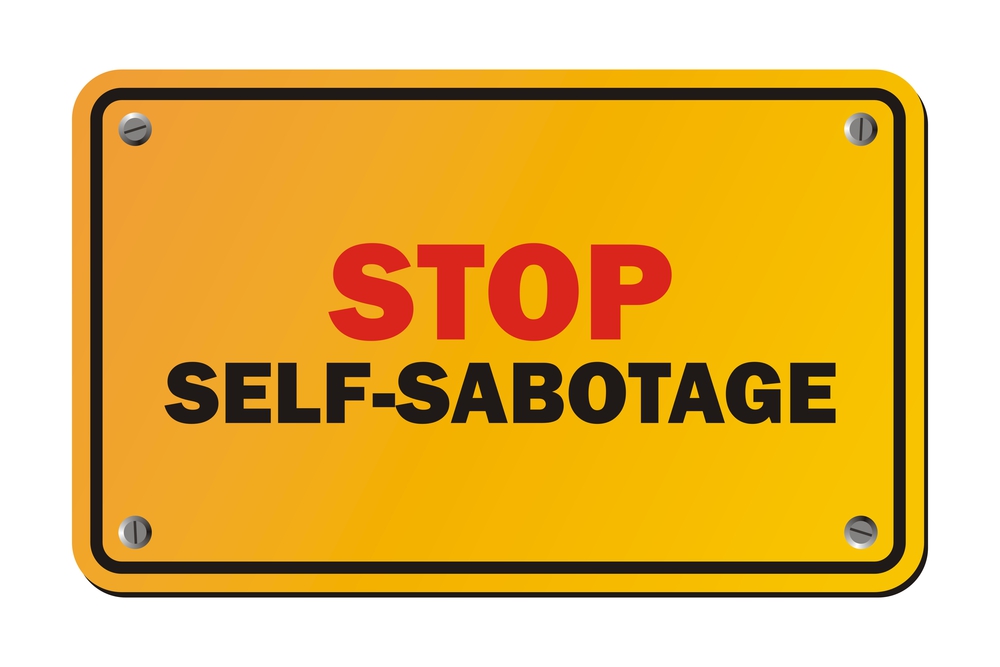If you want to break the chains of self-sabotage, finding your subconscious blocks and internal conflicts is an important key.
What causes self-sabotage?
In my last article, I explained how my life had been a roller coaster of ups and downs. I would start to see success, but I would eventually self-sabotage and let it all slip away.
Significant emotional events in my past caused deep programming that continued to negatively affect my actions decades later. These early written programs kept trying to protect me even though the situation in which they were created was long past and caused me to self-sabotage.
An Example of an Internal Conflict that Caused me to Self-Sabotage
I grew up in a nice neighborhood, but my parents couldn’t afford to buy me the latest fashions that many of my fellow classmates wore. I was often called out on this and ridiculed, and this developed into a strong dislike of people who showed off.
On the other hand, another part of me wanted to become rich and to be able to buy these things and say, “look at me now.” I wanted to prove to the world that I belonged. I wanted validation.
I discovered that my subconscious was using my hatred of showing off to push back against becoming successful. This deep, internal conflict was causing me to self-sabotage through procrastination.
Once I understood this conflict, I was able to acknowledge, accept, and work with my past self to help me move forward. Most importantly, it helped to reduce the pushback from my subconscious when I wanted to work on things that would help me be successful.
How did I find this and other conflicts that were holding me back?
In my last article, I mentioned I did a deep personal assessment incorporating three things. One was to examine my emotions. Another was to use cognitive behavioral therapy to look at my thoughts, actions, and feelings to help understand what was driving me. And the last was to do a character assessment.
In this article, I want to talk about how I did a character assessment.
A character assessment meant looking deep inside at who I was so that I could find and understand the programming that was running me.
I did this by questioning things about my character such as my past failures, values, and insecurities. This helped to give me clarity about the person who I am today, and more importantly, it helped me discover the internal programming that was driving my behaviors, especially that of procrastination.
Understanding who I am and the influences behind my behavior helped me better manage my inner conflicts and self-sabotage.
Things That I Examined
Past Failures
I examined my failures.
I was looking for patterns. I wanted to see where I had started to be successful and then failed.
What was my mindset, and what were my values at the time? What happened in the end and what were my excuses for when things didn’t go well?
One thing that really helped was to explore the stories I told myself and other people. I dug deep down and asked myself if they were really the truth.
The stories we tell ourselves and others are often only part of the truth. Facing the truth is hard because it means facing up to the fact that we were not good enough or that it was our fault for the failure.
Facing the truth can be hurtful, but, once acknowledged and accepted, it leads to clarity and enlightenment; it leads to a new start and freedom.
I discovered that part of my failure was that I was afraid of becoming someone that I did not like. I also discovered that I was afraid of loss, due to my adoption.
I was adopted when I was around two, and the loss of being taken away from my family spilled over into other areas of my life. If I had nothing that could be taken from me when things did not go well, it would not hurt as much, and this feeling was causing unconscious self-sabotage.
I also better understood my dislike of criticism. I had encountered some bullying when I was young for not having a rich family or for being part Japanese. This caused me to want to avoid standing out too much and attracting attention. This led to me delaying work that would cause me to be noticed.
My Values
I examined my values.
What were they? In what situations did I stick to or did not stick to my values?
I found that there were values that I kept outwardly, but there were many values I did not keep when it came to dealing with myself. I would keep deadlines with others, but I often missed the deadlines that I had set for myself.
I dug down and questioned this behavior. Why did I not value myself enough to keep my values in all situations?
This exercise led to insights that pointed to internal conflicts such as the one wanting to become rich but also wanting to be humble.
I Explored my Insecurities.
I had learned that our insecurities are great pointers to our past. Through their exploration, we can find the events that led to the early programming that is still affecting us today.
To understand my insecurities, I examined my ego and where I was seeking validation.
To examine my ego, I looked at my stubborn points:
I liked doing things on my own. I didn’t like to discuss deep problems. I let friends go if I felt that they had betrayed me. I was not fully honest about my situation when asked because I was afraid of looking weak. I hated people or situations that were not fair.
I explored each of these and others. Why was I feeling reluctant to change? When did this start? Would I be willing to change? If I felt any hesitancy around my answer, I explored it.
This led to big insights into my past and showed me why I was behaving in certain ways depending on the situation.
Again, a lot of this came from being adopted and being attacked for being part Japanese. My early programming had told me that I had to take care of myself. I couldn’t rely on others.
I also looked for needed validation.
Many people seek validation, but they do not realize it.
They do things to attract attention and praise. They want to show that they are capable even when others doubt or put them down.
This validation points to basic needs that we want to meet such as love, respect, acknowledgement, capability, and control. Trying to meet these needs without really understanding them, can lead to unhappiness and to sabotaging behaviors such as procrastination.
I wanted to be rich, because I wanted a life of freedom and happiness which I thought money would bring me. Unconsciously, I also wanted respect and acknowledgement. I had a lot of people who made fun of me.
This conflicted with some of my core values deep inside. I did not want to become a showoff just to prove to people that I was capable. This deep conflict caused me to self-sabotage.
As I explored, I started to ask myself why I was doing certain things. I started to ask myself if I was looking for some kind of validation. If so, I started digging. What kind of need did this point to? What is the origin of this need? Why do I feel that I do not have it? What needs to happen to have this need fulfilled?
These questions led to insights that helped me better understand my self-sabotage.
Tips for Doing Your Own Character Assessment
First and foremost, you must be honest with yourself. Facing the truth can be difficult but, by doing so, it will give you clarity about your character.
Some people put all the blame on themselves. Others put all the blame on others.
When doing this, it is important to dig down and go past the stories that you tell yourself. Even though we do not want to face the truth, facing the truth leads to freedom, and it will help you discover the events that are leading to self-sabotaging behaviors.
Let Your Mind Wander Instead of Using Logic
There are several ways to start a character assessment:
You can sit down and start with a journal. You can let your mind wander while you go for a walk. You can try to enter a meditative state by closing your eyes and relaxing. There are also self-hypnotism videos on YouTube to help you dig into your past.
When you do start, instead of relying on logic, ask yourself questions and let your mind wander to see what will appear. Don’t push or force yourself. Just let your mind wander and see what comes up. When you feel emotions, ask yourself what they mean to you. Don’t try to push them away or become irritated. Use the emotions to help you find past programming.
Dig Deeper
Dig into your findings. Ask questions. Why is this memory or feeling so important to me? Is that all? What else is there? Is what I see the real picture or the story I have created for myself?
Validate Your Findings
Once you find answers, validate them.
Is what happened then still significant in this moment? Is what I think really true or are there parts I am avoiding? Am I being really honest with myself?
Again, let your mind wander when you ask these questions.
Important Questions That Will Unlock Deep Insights into Yourself
Here are some questions that can help:
- What is the thing that I want people or that one person to say to me? What do I really want to hear from them?
- Why am I afraid to let go? Can I let go? What would it take to let it go?
- Am I really willing to change?
- What is holding me back?
Bringing it all Together
Don’t push what you find away or deny it.
It happened; acknowledge it no matter how painful it was.
Next, accept that it happened. Maybe it was your fault or the fault of others. Accept that it happened, and it is time to move on.
Finally, make amends, forgive, and atone if possible.
In some cases, it is not possible to atone, but it is time to move on instead of using it to hate yourself or to use it to blame someone else for your situation. You learned important lessons from it, and it is time to move on. Ask yourself if you can let it go. If it is a younger version of yourself trying to protect yourself, ask them if they would let it go and work with you to create a new future.
Conclusion
By doing a character assessment, I was much more able to deeply understand myself. Sometimes it was quick, and for others, it took time.
Asking myself hard questions helped me to come to terms with a lot of my past, and this helped to reduce the pushback from my subconscious helping me to move forward with my goals.
I encourage you to do your own character assessment. A character assessment can help you find the subconscious programming influencing your behavior and causing self-sabotage.
More Information
Please sign-up for my newsletter if you would like to get more articles sent directly to you on mindset and procrastination.




Pingback: I just stopped thinking. I figured out that using my brain was the whole problem. - Daniel Hall Life Coach | Create a Strong Mindset